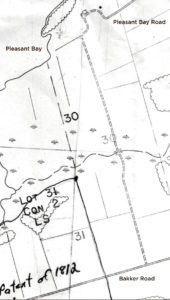Comment
A necessary fight
Taking back Pleasant Bay Road will be hard. There are other roadways and many more unopened road allowances where the County’s claim may be challenged. The County could find itself entangled in a legal thicket for years. Yet, that is precisely what it must do. Consciously and deliberately.
When gates were erected across Pleasant Bay Road earlier this year, the municipality could have acted immediately to reclaim the public’s access to this roadway and Pleasant Bay. But now months have gone by, and others are beginning to take notice. In a heartbeat, steel barrier gates could go up on every Hillier roadway leading to water—barring the public, firefighters, emergency services and others from this shoreline and access road.
It is not a new fight. There have been other attempts to restrict public access to Hillier’s beaches, dunes and waterways.
Sometimes it is done with the best of intentions. It is unfortunate, but some abuse the privilege of public access to these lands—littering and ripping up the dunes. Lacking another remedy, some property owners view gates or barriers as the only means to control these destructive activities.
Others seek to assert control—and in time, ownership—over these public lands. A 1993 decision of the Ontario Court, Grey Bruce Snowmobile Trails Inc. v. Rouse, Shearer & Morris provides a roadmap, so to speak, guiding land owners seeking to do just this.

Detail from a map produced by the Ministry of Natural Resources in 1982 depicting Pleasant Bay Road as a solid line inside lot 30, then looping toward the Eggleton Cannery and home, before turning south to join Bakker Road.
Every road with access to Hillier’s beaches and dunes is vulnerable to such a claim. It is up to the municipality, therefore, to assert its ownership. The longer it puts this off, the more expensive it will be.
Maps, unfortunately, don’t paint a complete picture. Most current maps show Pleasant Bay Road ending short of the Bay’s edge. Many older maps, including the Belden’s Atlas as well as Ministry of Ontario Natural Resources maps published in 1982, depict the roadway forming a short crescent toward the home and cannery owned by the Eggleton family. It then proceeds west a short distance, before turning south and joining what is now known as Bakker Road.
Furthermore, there is a vast amount of evidence that the roadway has been used for a century or more. Farmers on the second concession hauled their tomatoes across the road, through the marsh to the cannery. Others have used the public access to get to Pleasant Bay for fishing and hunting. It is the only public access to this waterway.
If Pleasant Bay Road is sacrificed simply to avoid a protracted legal fight, public access to Hillier’s beaches and dunes could disappear quickly—save for nine weeks each summer at North Beach.
We didn’t always take such a cavalier attitude to water access. In December 1835, an Orderin- Council explicitly reserved “the fishing grounds, beaches and bars on that part of the shore of Lake Ontario extending from Salmon Point to the Village of Wellington and from Huyck’s Point to the westerly extremity of Weller’s Bay for the public benefit and not for disposal to individuals.”
They understood that when water access was taken away—it would be gone forever.
Other municipalities have been more proactive in asserting their ownership over their roads and unopened road allowances. Gordon- Barrie is a township on the northwest corner of Manitoulin Island. Like Prince Edward County, the township is surrounded by water—with irregular roadways providing access to the public.
In 2009, the township passed a bylaw declaring clear and unequivocal ownership of its unopened road allowances. It further enshrined the principle that the public has the right to pass over unopened road allowance.
“The right of access of the public to an unopened road allowance is paramount, and therefore the Municipality does not have the right to permit the use or improvement of a road allowance in such way as to restrict public access to it.”
The Township made it clear that the public’s right of access does not carry with it the right to make any improvements or alterations (i.e. gates to restrict access). The township has asserted its right while disavowing any obligation to maintain or improve the roadway.
The Township of Gordon-Barrie may provide a useful template for Prince Edward County.
Time is a factor. The longer the question of ownership is allowed to languish, the stronger the claim by the abutting land owner becomes.
It is only the municipality that can assert this right to access to County roads and unopened road allowances on behalf of the public. Now is not the time for Shire Hall to be timid. There is much at stake.
We have arrived at one of those moments in time when leaders must act—it is now, or never.

Comments (0)